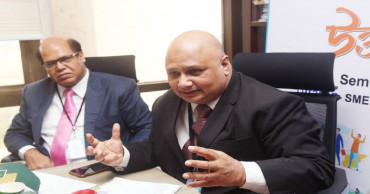small and medium enterprises
Bangladesh, Japan forge stronger SME collaboration at ICOSA roundtable in Tokyo
Strengthening ties between Bangladeshi and Japanese small and medium enterprises (SMEs) took centre stage at a roundtable discussion between members of the Bangladesh B2B mission and the International Cooperation Organisation for Small & Medium Enterprises in Asia (ICOSA).
The session was held on the second day of the ‘Investors B2B Japan’ event at the UNU Headquarters in Tokyo on April 25.
Professor Dr Naohiro Kurose, President of ICOSA, expressed strong optimism about future cooperation.
SME sector can help resolve unemployment problem: Experts
Drawing from ICOSA’s recent study tour to Bangladesh, he highlighted Japan’s longstanding commitment to SME growth and the potential for enhanced bilateral engagement.
Focusing on technology transfer and industrial policy, Professor Wada Masatake, a senior ICOSA member, proposed regular exchanges between Bangladeshi and Japanese entrepreneurs to build sustainable business partnerships.
He stressed that such initiatives would significantly contribute to regional development.
From the Bangladesh side, Mikhail Idris Islam, Director of HAISON, delivered a key presentation outlining opportunities for SME cooperation.
He also reflected on the deep-rooted historical relationship between Bangladesh and Japan, reinforcing the natural alignment of interests in strengthening SME ecosystems.
DCCI opens ‘SME Development Department’ to facilitate CMSME sector
Welcoming the participants, Hideki Murakami, Deputy Head of UNIDO ITPO Tokyo, expressed hope that the dialogue initiated at the roundtable would evolve into long-term collaboration between the two countries' SME sectors.
According to a media release, the session reaffirmed a shared commitment to fostering greater interaction, regular entrepreneur exchanges, and joint ventures, marking a significant step towards a promising future in Bangladesh-Japan SME cooperation.
9 months ago
Small businesses pin hopes on budget to stay afloat
Hit hard again, this time by the second wave of the Covid-19 pandemic, Bangladesh's small and medium enterprises (SMEs) are now pinning hopes on the upcoming budget to stay afloat. Not to mention that the survival of these firms is important as they are one of the major employers in the country's economy.
Ranging from short-term liquidity and tax cuts to simple compliance for availing loans and extension of debt repayment periods by at least two years, these enterprises seek an array of relief from the government to tide over the economic crisis. These leeways to SMEs, entrepreneurs say, will not only help the sector survive but also ensure the preservation of jobs.
Read Speakers urge for simplifying process of stimulus fund disbursement to SMEs
Kazi Sazedur Rahman, the president of Paper Cup Manufacturers' Association of Bangladesh (PCMAB), told UNB that though a slew of stimulus packages was announced by the government last year, over 80 percent of the small entrepreneurs in Bangladesh failed to reap the benefits of the same due to corruption in the system.
“Though Bangladesh Bank said that over 72 percent of the stimulus packages worth Tk20,000 crore were disbursed as loans until March 31, the reality is different. Some 95 percent of the disbursed loans were availed by corporate houses through sister concerns floated overnight," said Sazedur, also the MD of KPC Industry.
According to him, the SME sector has again been hit hard by the second wave of Covid. "The government has so far been very supportive of the sector, but the problem lies at the loan distribution level. Many SMEs are already out of the banking system. If more help is not extended to the sector in the coming fiscal, then many more SMEs will disappear."
Also read: Central bank to support SMEs build resilience
The small entrepreneurs also seek a substantial cut in the value-added tax on various items in the upcoming budget -- from the existing 15 percent to 5 percent. "Lower taxation will, in turn, benefit the economy as many SMEs don't acquire trade licenses to avoid paying 15% VAT. So, a cut in VAT will benefit both the government as well as the SMEs," Sazedur said.
"Moreover, the central bank should immediately impose a moratorium on old loan repayments as it has already extended the deadline till June 30 for banks to disburse stimulus funds among businesses in the cottage, micro, small and medium enterprise (CMSME) sector. Otherwise, many defaulting entrepreneurs won't get the benefit."
Read Raise threshold for financial reporting of SMEs: DCCI
4 years ago
Central bank to support SMEs build resilience
Bangladesh Bank will provide a total of Tk 60,000 crore financing to Small and Medium Enterprises (SMEs) by 2023 to ensure economic resilience that will enhance GDP, employment, and inclusive development.
Deputy Governor of the central bank Abu Farah Md Naser said this at the Virtual Dialogue titled “Creating Resilient Recovery for Businesses through Enhancing Investment Opportunities: A Case of Southwest Bangladesh.”
Business Initiative Leading Development (BUILD) with support from the PROKAS program of the British Council organized the dialogue.
As the Chief Guest of the programme, Md Naser also said the Bank has taken the initiative to extend the timeline of the current stimulus package by 2023.
“Some Tk2,000 crore collateral-free loan opportunity for SMEs made available under the credit guarantee scheme should be utilized as much as possible,” he added.
He held the example of City Bank’s Leno financing model that uses digital technology to process loan applications in the shortest possible time and encouraged other banks to follow the example. For banks operating in grassroots level, he encouraged digital technology to ensure that loan evaluation and processing can be managed in the shortest possible time.
Also read: DCCI for SME act, new definition of CMSMEs
Md Naser thanked BUILD for organizing the meeting to address the concerns of cottage, micro, and small enterprises from remote regions.
“The central bank is also facilitating expansion of aggregate demand by nurturing Bank-MFI linkages that has a base of three crore people across the country,” he added.
During the discussion, the Mayor of the Mongla Municipality of the Bagerhat District Sk Abdur Rahman, mentioned that the neediest section of the population: the cottage enterprises, fishermen and the working class have largely missed the benefits of the package.
He suggested that banks should provide not only credit but also technical support to ensure that the credit is properly utilized for repayment.
“Training and capacity building provided by the government at the local level should be scaled up,” he encouraged speedy completion of the Mongla airport to ensure accelerated investment and development in the region.
BUILD Chairperson Abul Kasem Khan noted that the COVID-19 has affected business all around the country, especially the MSMEs. The timely initiatives by the Prime Minister and the government to prepare the country to tackle the health challenges as well as economic effects of the pandemic combined with the all-out action by the Bangladesh Bank and other government agencies were instrumental in protecting the country from the worst consequences.
Also read: CMSMEs can now take term loan under stimulus package
“Aside from supply side interventions, there also need to be demand side initiatives so that the income and consumption of the ordinary people can be boosted to reinject dynamism in the economy.,” he added.
He requested for social safety bond for the small entrepreneurs and some tax changes in the Tax policy and extend tax incentives so that large scale industries can also sustained.
BUILD’s CEO Ferdaus Ara Begum informed in reply to a point raised by BB that BUILD is working closely with the Ministry of Industries to get the definition of cottage, micro, small and medium enterprises to ensure that smaller and vulnerable businesses receive more policy priority and support.
“As BUILD continues to engage in research and facilitation of the businesses in Mongla and Bagerhat the support from the central bank will be essential,” she also added.
In the keynote presentation, Md. Tahmid Zami, Additional Research Director of BUILD noted that in the local BSCIC Industrial Estate of Mongla, around 50% businesses are out of operation and only 20% workers are retained in many factories.
“The coconut oil mills, rice mills, small traders, and many other sectors have faced tremendous shock due to the COVID-19. Finance should be distributed to the cottage, micro and small enterprises without stringent requirements for rescuing the endangered businesses,´ Tahmid added.
He referred the e-survey in the form of a KPI conducted by BUILD during February-March, 2021 covering chamber representatives, local Government and BSCIC, Bank officials and Businesses.
Also read: SMEs are lifeline to country's economy: Tipu Munshi
Husne Ara Shikha, General Manager of SME and Special Credits Department informed about 6% of total money disbursed for SME have gone of Southwest region, in case of women, in number it is about 5.43% of the total and noted that there are both positive signs and mixed results in distributing credit to SMEs in the region.
Syed Abdul Momen, Head of SMEs of BRAC Bank mentioned that the definition of SMEs should be modified to target the cottage, micro and smaller enterprises more effectively.
The decentralized credit management of BRAC and the agent banking sets a good example for the banking industry of the country for meeting the needs of the businesses in the rural level.
S Humayun Kabir, Vice President of Bangladesh Frozen Foods Exporters Association requested for a proper insurance policy for the shrimp industry as well as higher incentives such as cash subsidy to ensure better development of the high-potential sector. Cold storage facility for the shrimp and fish sectors should be boosted.
He further suggested to consider the sector as agro-based sector while extending support facilities. In case of getting finance Banks and FI request for higher collateral considering uncertainty of the production.
Md. Mofidul Islam Tutul, Director of Khulna Chamber of Commerce and Industry stressed on the prospects of the jute sector.
4 years ago
IFC supporting SMEs during pandemic
IFC is helping to preserve thousands of jobs in Bangladesh through an investment in Prime Bank Limited to support small and medium enterprises (SMEs) and companies affected by the COVID-19 pandemic.
5 years ago
Need joint efforts for SME sector: Minister
Industries Minister Nurul Majid Mahmud Humayun on Thursday called for concerted efforts to sustain entrepreneurs and employment in the Small and Medium Enterprises (SME) sector during the coronavirus pandemic.
5 years ago
Robi brings cloud-based SME solution ‘Amar Hishab’
Robi, a digital services provider has recently introduced ‘Robi Amar Hishab’, a cloud-based solution for Small and Medium Enterprises (SMEs).
5 years ago
SMEs need boost from formal banking channels, say speakers
Speakers at a seminar here have said millions of small and medium enterprises (SMEs), cottage and micro sector businesses that have remained out of formal banking channel need a big push with proper backing from larger financial institutions.
6 years ago

.jpg)



.jpg)




